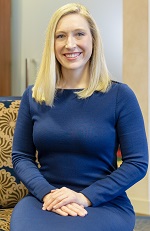The interview below is part of an ongoing effort by McGuireWoods to profile up-and-coming women leaders in private equity (PE). To read previous profiles, click here. To recommend a rising star for a future interview, email Amber Walsh at [email protected].

Kristin Archer is a vice president with Trivest Partners, a middle-market PE firm that partners with founder- and family-owned businesses. She joined the firm in 2019 as a member of the deal team investing the $630 million buyout fund. Her previous experience includes roles at Thompson Street Capital Partners and Deutsche Bank. Archer received her BS from Indiana University, MS in finance from the International University of Monaco and MBA from Stanford Graduate School of Business. Archer is a CFA charterholder.
Q: What both attracted you to PE but potentially concerned you about this chosen career path?
Kristin Archer: I grew up in a dual-career family: My dad worked for a multinational corporation and my mom founded a company. I had the opportunity to take over my mother’s business but realized it wasn’t the right path for me, so I helped my mom sell her company. Through this process, I saw firsthand the experience founders often go through when selling their businesses. I was drawn to PE to guide other family- and founder-owned companies with their succession plans.
The media and politicians often portray PE as detrimental to society, which initially concerned me. I questioned whether I could find meaning in a career in PE. What I’ve seen since working in PE is that negative headlines are used to sell newspapers and win elections; they don’t fairly represent PE’s positive impact.
In the organizations where I’ve worked, we create jobs and distribute wealth. Trivest invests in growing organizations, which often includes adding headcount and developing talent. One portfolio company commits significant resources to HVAC and plumbing schools and apprenticeship programs, recruiting and training individuals without a college education into high-paying jobs.
Across all of our investments, Trivest offers equity programs to portfolio company employees. Midlevel employees now have the chance to own part of the company for which they work and generate financial returns alongside investors. Frequently, this access to wealth creation wasn’t available before PE invested. The work I’m doing aligns with my values and I’m proud to see how PE makes the world a little bit better.
Q: What is a lesson that you have learned concerning what’s required for success in PE?
KA: It takes patience and perseverance to make great investments. At Trivest, we might speak with a business owner over several years until she decides it’s the right time to sell and we’re the best partner for her enterprise. We frequently buy companies from founders who have never sold a business before. We explain to sellers what to expect from a Trivest deal and how our process differs from other potential acquirors.
This education process is time consuming. Other investors may get frustrated and abandon a process that doesn’t move quickly enough. By slowing down and building a relationship with the seller, we’re able to invest in overlooked opportunities.
Q: Why is it important for more women to pursue careers in PE?
KA: A career in PE offers women a seat at the table and influence over what the next generation of leaders looks like. I serve as a voice for women not only at my firm, but also at the five portfolio companies I work with. When we recruit a new member to the management team, I specifically ask for female and underrepresented minority candidates to be included in the process. PE provides a remarkable opportunity for women to influence the business environment.
Q: How do you believe women of your generation will be able to influence in the PE industry, particularly as the career path continues to evolve?
KA: Women are more likely to be in dual-career relationships than men. With more women in PE comes the need for more flexibility in the workplace. One can’t immediately assume there’s a spouse at home who’s able to care for a sick child or handle other last-minute emergencies. I’m fortunate to be at a firm where my colleagues value family. It’s not unusual for a partner to leave “early” at 6 p.m. to coach his kid’s basketball team or be out of the office one morning for a child’s doctor appointment.
I know this type of behavior isn’t common at other firms. My hope is that my generation will empower men and women to have fulfilling lives both at work and at home.
To contact Archer, email [email protected].
Come see Kristin next month at our 17th Annual Healthcare Private Equity & Finance Conference. Join her and others as they discuss “How to Win a Competitive Process.”